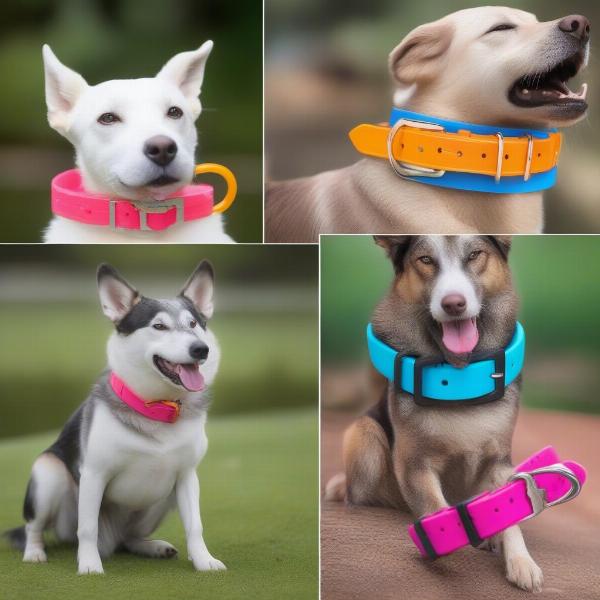Dog rubber collars are a popular choice for pet owners, offering a unique blend of durability, comfort, and style. Whether you’re looking for a waterproof option for swimming, a strong collar for training, or a vibrant accessory to match your dog’s personality, rubber collars offer a practical and appealing solution. This guide will delve into everything you need to know about rubber dog collars, from their benefits and drawbacks to choosing the right size and style for your furry friend.
Benefits of Using Rubber Dog Collars
Rubber dog collars boast several advantages over traditional materials like leather or nylon. Their waterproof nature makes them perfect for water-loving dogs, preventing that unpleasant wet dog smell and reducing the risk of skin irritation. Rubber is also incredibly durable, able to withstand rough play and resist chewing, making it a great choice for active dogs. Moreover, rubber collars are easy to clean, a simple wipe down removes dirt and grime. Many rubber collars come in a wide array of colours and designs, allowing you to express your dog’s unique style.
 Benefits of Rubber Dog Collars
Benefits of Rubber Dog Collars
Choosing the Right Rubber Dog Collar
Selecting the correct size is crucial for your dog’s comfort and safety. Measure your dog’s neck circumference and add a couple of inches for a comfortable fit. Consider the width of the collar as well, thicker collars are generally more durable but may be less suitable for smaller dogs. Think about your dog’s activity level and choose a collar with appropriate hardware. For strong pullers, a sturdy metal buckle is recommended. rubber dog collar
Caring for your Dog’s Rubber Collar
Maintaining a rubber collar is simple. Regularly wipe it down with a damp cloth to remove dirt and debris. For more stubborn stains, use mild soap and water. Avoid using harsh chemicals or abrasive cleaners which could damage the material. Inspect the collar regularly for signs of wear and tear, especially the buckle and D-ring. Replace the collar if you notice any cracks or damage.
Are Rubber Dog Collars Right for My Dog?
While rubber dog collars offer numerous advantages, they may not be suitable for every dog. Dogs with sensitive skin may be prone to allergies to certain types of rubber. If your dog has a history of skin allergies, consult with your veterinarian before using a rubber collar. rubber dog collars
Training with a Rubber Dog Collar
Rubber collars can be effectively used for training, especially for dogs who tend to pull on the leash. The added weight and grip of a rubber collar can help provide more control during walks. However, it’s important to use positive reinforcement methods and avoid using the collar to punish or inflict pain. dog accesories
Conclusion
Rubber dog collars offer a practical and stylish solution for many dog owners. Their waterproof nature, durability, and ease of cleaning make them a great choice for active dogs and water enthusiasts. However, it’s essential to choose the right size and material for your dog’s individual needs and to monitor for any signs of skin irritation or wear and tear. By following these guidelines, you can ensure your dog enjoys the comfort and benefits of a well-chosen rubber collar. xs dog accessories
FAQ
- Are rubber dog collars safe for chewing? While rubber is more durable than many other materials, no dog collar is completely chew-proof. Supervise your dog, especially if they are prone to chewing.
- Can I leave a rubber collar on my dog all the time? It’s generally recommended to remove your dog’s collar when they are unsupervised or crated to prevent entanglement hazards.
- How do I clean a smelly rubber dog collar? Wash the collar with mild soap and water, and allow it to air dry completely.
- What if my dog is allergic to rubber? Discontinue use immediately and consult with your veterinarian. Consider hypoallergenic alternatives such as nylon or biothane.
- Can I use a rubber collar with a dog tag? Yes, most rubber collars have a D-ring for attaching tags and leashes.
- Are rubber collars suitable for puppies? Yes, but choose a lightweight and appropriately sized collar for a growing puppy.
- Do rubber collars stretch over time? Some stretching can occur with prolonged use, especially with cheaper quality rubber.
ILM Dog is your trusted international resource for everything dog-related. From breed selection and healthcare to training, nutrition, grooming, and accessories, we provide expert advice and practical tips to help you provide the best possible care for your canine companion. We specialize in helping dog owners make informed decisions about their dog’s well-being, offering guidance on topics ranging from choosing the right dog breed to understanding complex health issues. We understand the unique challenges of dog ownership, and our team is dedicated to providing you with the resources you need to navigate these challenges successfully. For all your dog-related queries, reach out to our expert team. Email us at [email protected] or call us at +44 20-3965-8624. ILM Dog is committed to helping you and your furry friend live a happy and healthy life together.